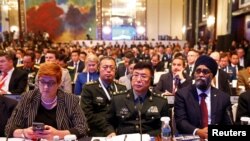Australia's intelligence laws are to be reviewed in the most comprehensive overhaul of national security legislation in decades.
The review will take 18 months and will be led by a former spy chief. It will be the most comprehensive review of Australia's intelligence laws since the 1970s. Much of its terms of reference are being kept secret but officials say the shake-up will look at how information is shared among the nation's six security and intelligence agencies, as well with other law enforcement bodies.
Analysts say the review is long overdue with existing laws designed for a previous era. They say the review would likely address the main threats facing Australia; terrorism, cyber-warfare and influence by foreign powers.
Australia's federal Attorney-General Christian Porter says the overhaul will help to integrate the various agencies that keep the nation safe.
"The control, direction and coordination of all of these agencies, and the way they interact with non-intelligence agencies and state-based agencies, such as state police forces. It is looking at how we share information and whether or not that can be improved on.It is looking at the overall staffing and resourcing, so it has a very holistic approach, and the other thing it will look at is accountability and oversight," said Porter.
The review comes amid rising fears in Australia over the influence of China in its domestic affairs.
Earlier this week media reports detailed allegations apparently contained in a top-secret report that China has attempted to influence Australia's political parties for the past decade, as well as every level of government.
Beijing has previously accused Australia of being anti-China.
Last year the Australian government introduced new foreign interference laws into federal parliament, which, if passed, would put a ban on all overseas political donations. In January, Australian opposition Senator Sam Dastyari was forced to resign over alleged links to Chinese authorities.
Australia's National Terrorism Threat Level remains set at "probable," which means security agencies believe that individuals or groups have the intent and capability to carry out a terrorist attack in Australia.
Australia to Conduct Indepth Review of Intel Laws
- Phil Mercer
- VOA News

SYDNEY —



